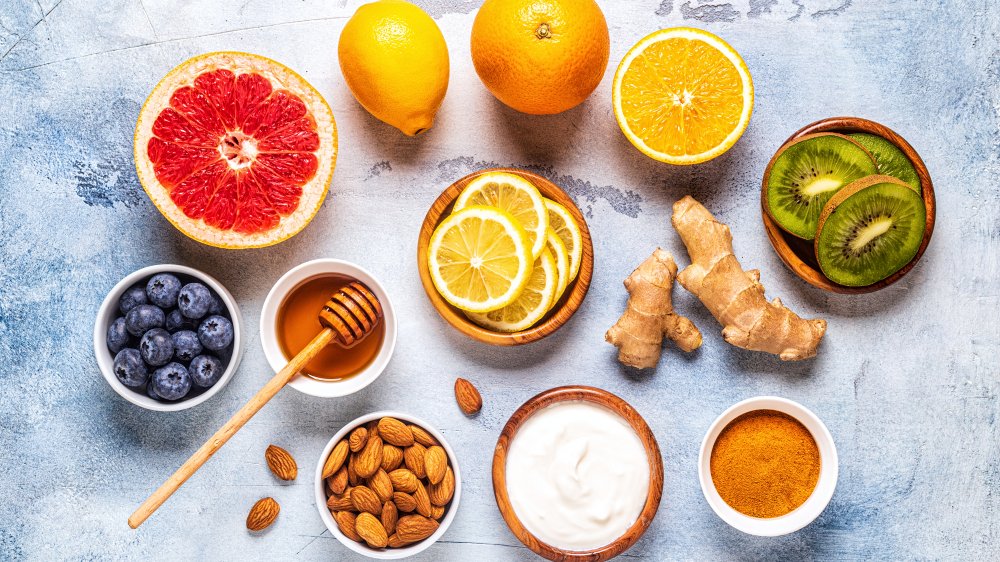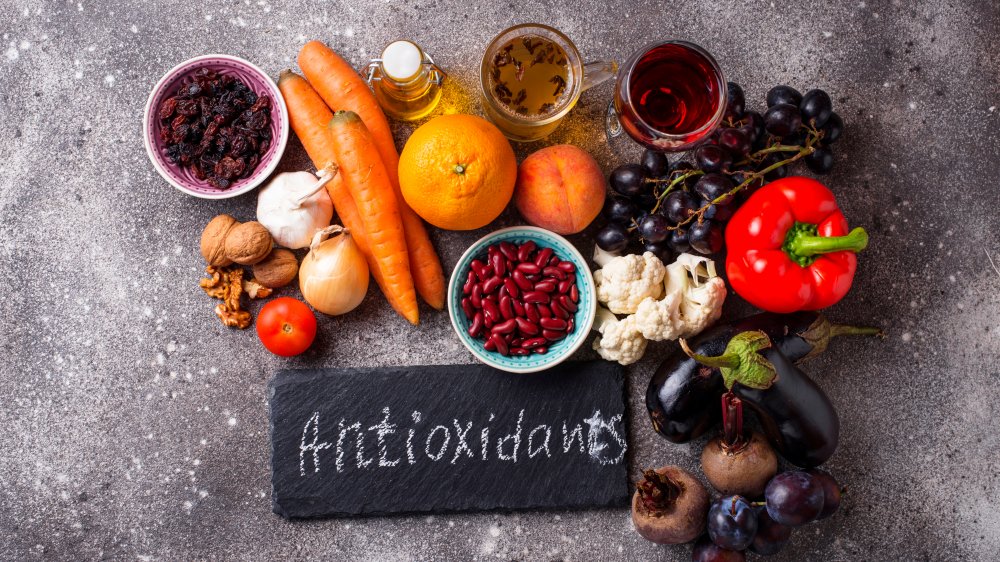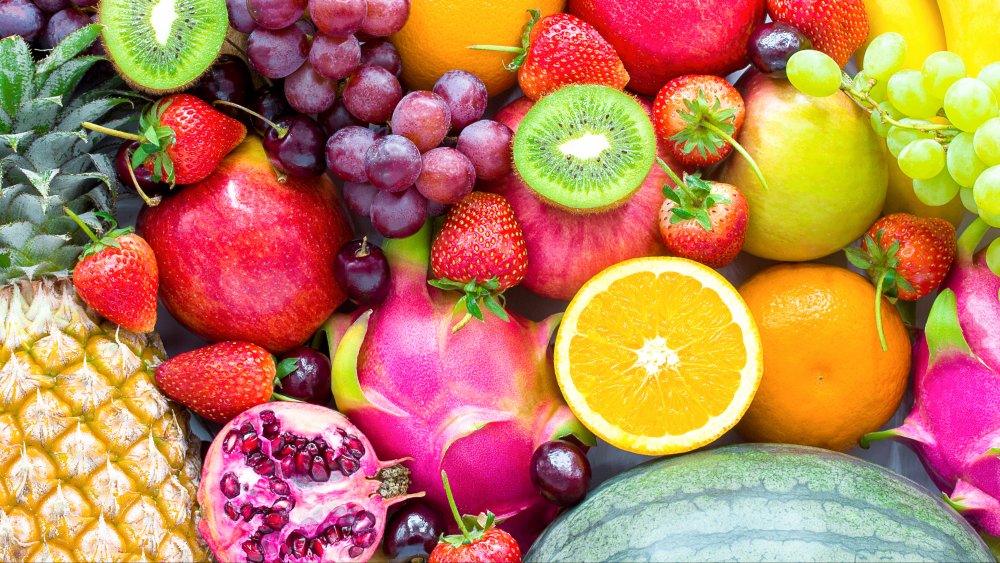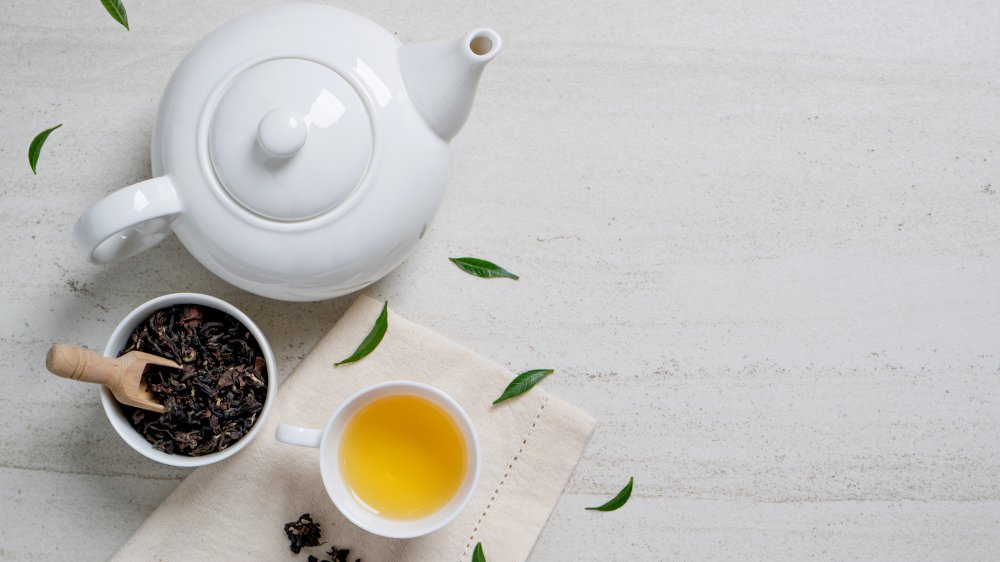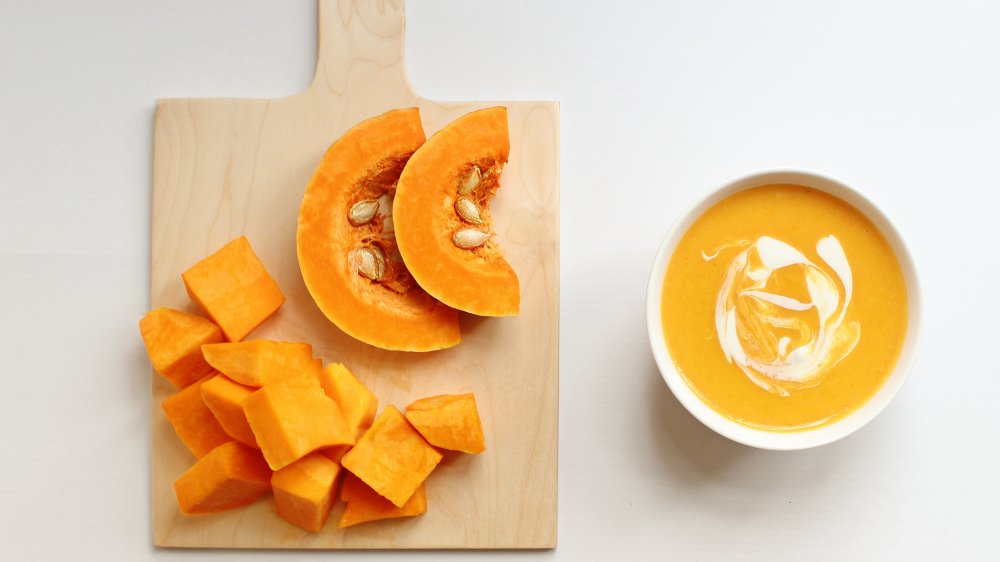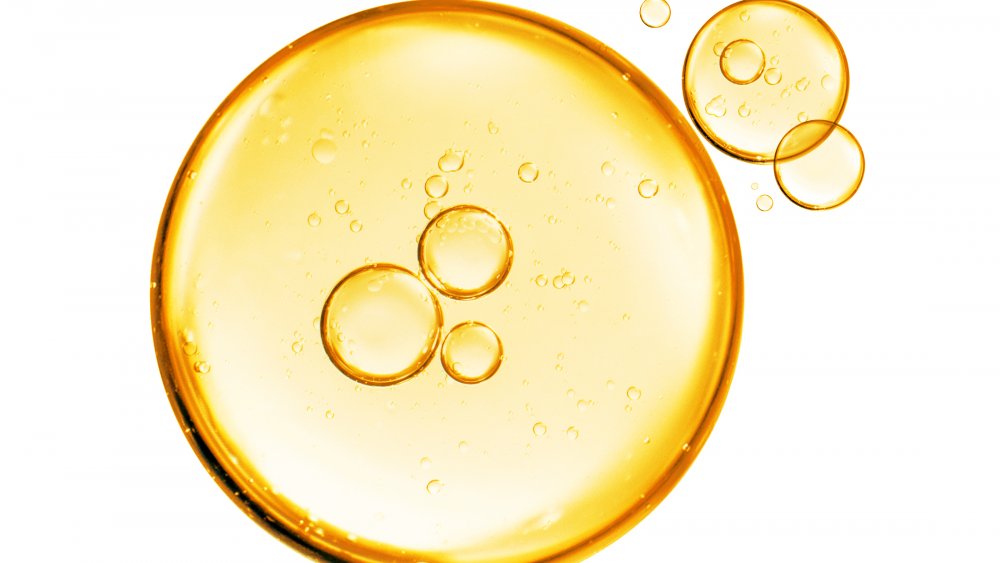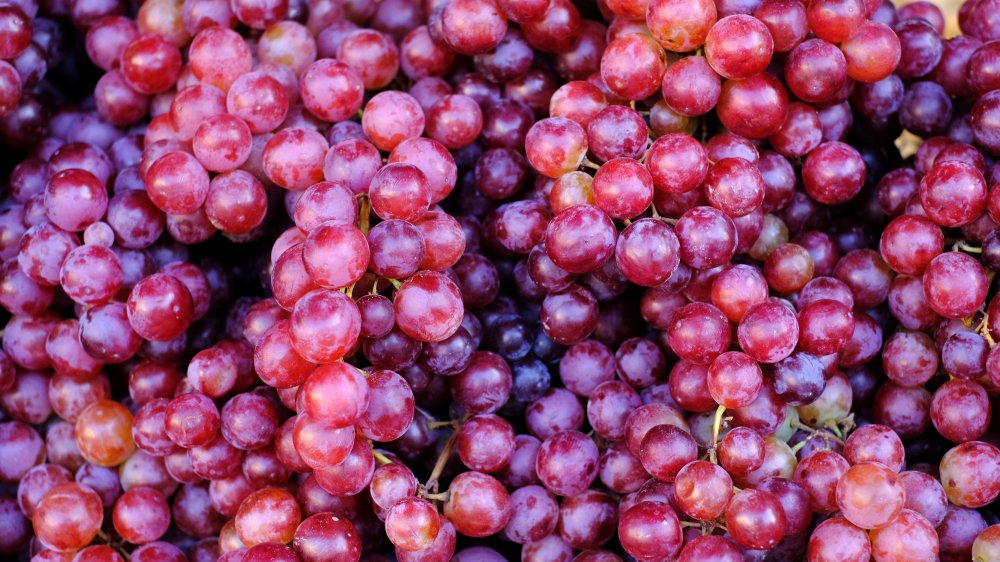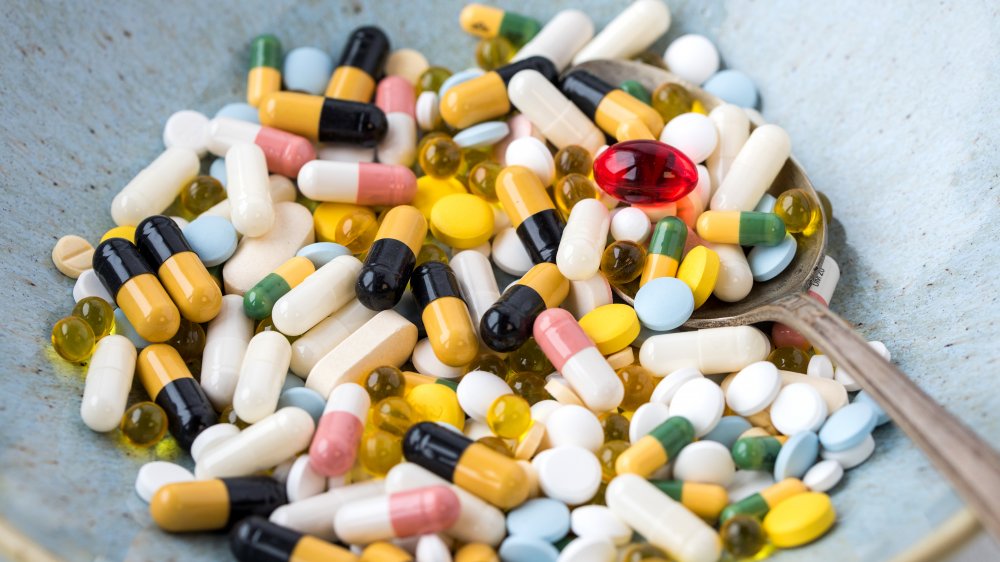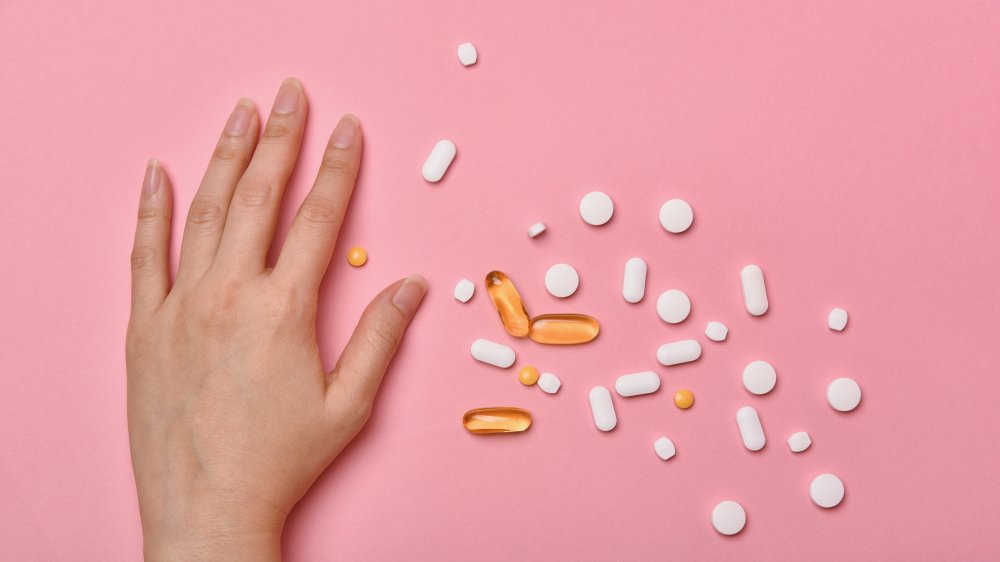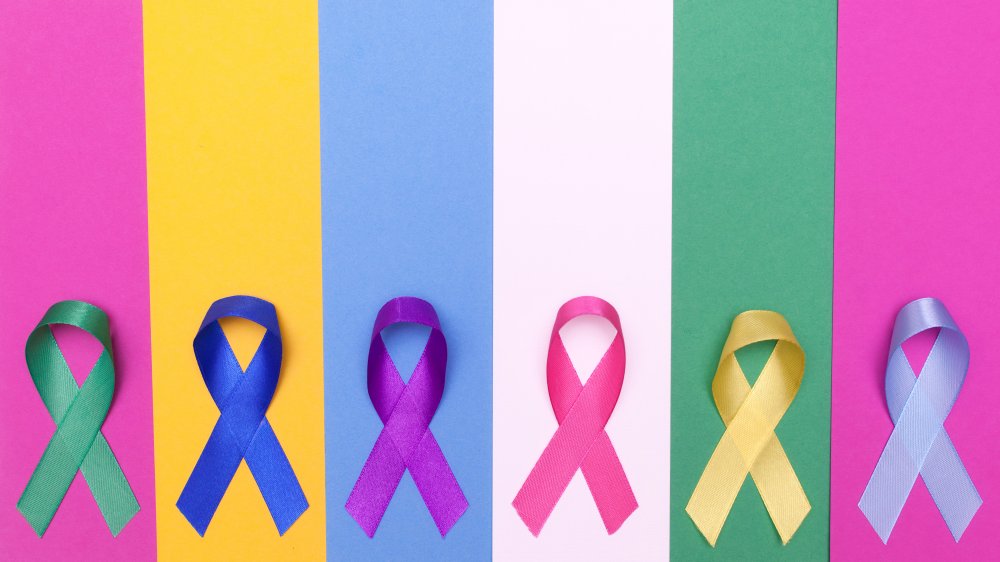Everything You've Ever Wondered About Antioxidants Explained
The word "antioxidant" gets thrown around a lot in conversations about health and nutrition. Most people understand that antioxidants are a good thing, and that foods high in antioxidants are healthy. But when it comes to what antioxidants actually do for our bodies and our health, many are unsure.
In a nutshell, antioxidants are chemical compounds found in foods (or made in a lab) that may prevent or delay certain types of cell damage in our bodies, the National Center for Complementary and Integrative Health explained. Truth be told, experts aren't exactly sure how such antioxidants work inside your body, but they do know that foods high in antioxidants are nutritious and can improve health. Below, we will go into detail about what antioxidants are, what they might do, what they certainly can't do, and what you should keep in mind if you're hoping to get more antioxidants in your diet.
Your body produces its own antioxidants
For all the talk about the importance of eating antioxidant-rich foods, many people don't realize that our bodies actually produce antioxidants all on their own. In fact, the term "antioxidant" doesn't indicate a nutritional property — a certain molecular structure that creates the functions of a certain vitamin, mineral, or macronutrient — but a chemical property, according to Harvard Health.
You may remember from your high school chemistry class that the three components of atoms are protons, neutrons, and electrons. Protons add weight and are positively charged, neutrons add weight and have no charge, and electrons add no weight and are negatively charged (via Lumen Learning). Antioxidants have extra electrons that they donate to other atoms in order to neutralize the charge of those other atoms and prevent them from "stealing" electrons from other molecules that can't afford to give them up.
Because these kinds of chemical reactions are happening in our bodies all the time, many of our cells naturally produce their own antioxidants to protect themselves from damage (via Harvard Health). So while antioxidant-rich foods are helpful, they're not the only way our bodies get antioxidants.
Antioxidants fight free radicals in your body
The purpose of antioxidants in your body is to neutralize another type of chemical compound called a "free radical," which in certain instances causes damage to your cells. While antioxidants have extra electrons, free radicals do not have enough electrons and will thus steal those electrons from other molecules, a review published in Pharmacognosy Reviews explained.
This isn't always a bad thing. Your immune system creates free radicals as a way to damage and destroy bacteria, viruses, and your own cells that have been damaged by these harmful intruders, Harvard Health revealed. However, too many of these free radicals in your body may lead to the destruction of important cells. That's where antioxidants come in.
Having the right balance of antioxidants versus free radicals is ideal, because free radicals will "steal" electrons from antioxidants — which have extra electrons to spare — instead of from another molecule that actually needs those electrons. While your body produces its own antioxidants, getting extra antioxidants through your diet can help ensure that your body has enough to adequately fight all of the free radicals, the number of which can increase when you're sick or exposed to unhealthy compounds like smoke, pollution, or alcohol.
With too many free radicals and not enough antioxidants, your body would be in a state called oxidative stress
Anyone who's ever dealt with intense work deadlines or a breakup knows that too much stress isn't a good thing. The same goes for the stress that happens in your body on a molecular level. Free radicals aren't inherently bad, of course, as they fight harmful molecules that enter your body and kill cells that have been damaged. However, they shouldn't have free reign. When the free radicals in your body greatly outnumber the antioxidants, your body goes into a state called "oxidative stress," according to Healthline.
Short periods of oxidative stress are okay. They happen when you're sick, when you drink alcohol, and even when you exercise and your muscles repair themselves. However, chronic oxidative stress — long, consistent periods — can actually damage your DNA, increase your risk of cancer, and might even speed up the aging process of your cells, Healthline detailed.
Fruits and vegetables are the main dietary source of antioxidants
The good news about antioxidants is that they're found in foods you're probably already eating. Namely, antioxidants are found in all plant foods, but primarily in fruits and vegetables. The National Center for Complementary and Integrative Health recommends eating a diet rich in fruits and vegetables — at least five servings a day, and a variety of different colors — because research shows that people who eat more of these things have a lower risk of several diseases, including heart disease, stroke, type 2 diabetes, and cancer.
However, there are a few important things to keep in mind here. While experts know that antioxidants exist and that they help fight damage caused by free radicals in your body, they don't know whether it's the antioxidants in fruits and vegetables or some other component(s) that help lower disease risk. In other words, they don't yet understand exactly how fruits and vegetables improve health and fight disease, only that they do.
Still, this shouldn't change the way you think about fruits and vegetables. No matter how they do it, fruits and vegetables absolutely improve your health and lower your risk of disease, according to the National Center for Complementary and Integrative Health.
Green tea and cocoa are great sources of antioxidants
Fruits and vegetables aren't the only source of antioxidants. Studies show that green tea is high in polyphenols, a specific antioxidant compound. A 2013 review in Molecular Nutrition & Food Research found that these green tea polyphenols could have a protective effect against cancer. The research suggests that polyphenols can both trigger processes that damage and destroy harmful cancer cells, and prevent damage to other healthy cells in the process. That said, this effect is still being studied, and drinking tea is absolutely not powerful enough to prevent or cure cancer.
Likewise, cocoa (found in chocolate and cocoa powder) contains polyphenols as well as flavonoids and methylxanthine compounds, all of which have antioxidant properties. In a 2011 review published in Antioxidants & Redox Signaling, the authors found that "flavonoid-enriched cocoa" could help regulate blood pressure and blood flow through the heart. Again, though, experts are yet to understand exactly how this happens. It's also important to keep in mind that many chocolate products contain things like saturated fat and added sugar, which can be harmful to health in high amounts.
Beta-carotene is a major antioxidant found in red, yellow, and orange produce
Beta-carotene is a "red-orange pigment found in plants and fruits, especially carrots and colorful vegetables," Medical News Today explained. It's also a carotenoid and an antioxidant. Carotenoids are converted to vitamin A (an essential nutrient) in the body, and provide approximately half the total vitamin A needed from your diet — that's important because vitamin A is necessary for immunity, vision, reproduction, and other bodily functions. Getting adequate beta-carotene can help with immune function and might reduce your risk of certain cancers, heart disease, and cataracts (via Healthline).
It's possible to take beta-carotene supplements, but studies have yet to prove that they are effective. If you do take a supplement, you shouldn't take more that 180 milligrams of beta-carotene per day. The better choice is to get beta-carotene through food. Because beta-carotene and other carotenoids are pigments that turn foods red, orange, and yellow, you can get adequate amounts of it by eating foods that are naturally these colors. Carrots, sweet potatoes, winter squash, cantaloupe, and apricots are all rich in beta-carotene, as are some green foods like spinach and kale (via WebMD).
Vitamin C is a powerful antioxidant found in fruits and vegetables
A particularly antioxidant and nutrient found in food is vitamin C. Because our bodies cannot produce vitamin C and must instead get it from food, it is considered an essential nutrient. In a 2003 review published in the Journal of the American College of Nutrition, researchers combed the existing evidence and found that while diets high in vitamin C-rich foods are associated with lower risk of heart disease, stroke, and cancer, it isn't clear whether this is because of the high vitamin C content of the diet or something else.
Still, experts recommend a diet rich in fruits and vegetables, nearly all of which contain vitamin C. The highest concentration of vitamin C is found in citrus fruits (oranges, lemons, limes, grapefruits), tomatoes and tomato juice, and potatoes. Other good sources are bell peppers, kiwi, broccoli, strawberries, Brussels sprouts, and melon, according to the National Institutes of Health. If you're eating five servings of fruits and vegetables per day, you're almost certainly getting enough vitamin C.
Vitamin E is a disease-fighting antioxidant
Although there are eight forms of naturally occurring vitamin E, only one type — alpha-tocopherol — is usable and beneficial to the human body, according to the National Institutes of Health. Because vitamin E is a fat-soluble vitamin, you need to have adequate amounts of fat in your diet in order for the vitamin E you eat in foods to actually be absorbed. How much of the vitamin E you eat that gets used by your body depends on how much of it is absorbed in your small intestine and then metabolized in your liver and passed into your bloodstream.
Experts are still figuring out exactly how the antioxidant properties of vitamin E help fight diseases like heart disease and cancer, but they recommend getting adequate amounts in your diet. Foods that are especially high in vitamin E are wheat germ oil, seeds, nuts, peanuts, spinach, and broccoli. If you eat adequate fruits and vegetables and eat nuts, seeds, or nut butter every day, you're likely getting adequate amounts of vitamin E. If you don't eat these foods regularly, consider supplementing with up to 15 milligrams of vitamin E every day.
Flavonoids are an important group of antioxidants
Flavonoids are a group of antioxidant compounds that perform various important functions in the body. Arguably the two most talked-about flavonoids are flavanols, which are found in grapes, red wine, tea, and several fruits and vegetables, and flavan-3-ols, which are found in cocoa, tea, apples, grapes, and berries (via Healthline).
However, there are also flavones that are found in celery, parsley, peppermint, red peppers, and chamomile. Flavanones, another flavonoid, are found in citrus fruits. Isovlavones are found mainly in soybeans. Anthocyanins, the last flavonoid category, are found in grapes, wine, and berries, Healthline explained.
Like other antioxidants, flavonoids help neutralize excess free radicals in your body to prevent unnecessary cell damage. They may have some unique qualities as well. In a 2015 review published in Nutrition Review, the authors compiled existing evidence and found that all five types of flavonoids mentioned above could potentially help reverse or prevent high blood pressure. However, experts don't know whether or not taking flavonoid supplements is safe. As such, you're better off just eating plenty of foods that are naturally high in flavonoids.
This is the number one source of antioxidants in the Western diet
Anyone who can't start the morning without a cup of coffee should be encouraged by the fact that coffee might actually be the number one source of antioxidants in the modern Western diet. In a 2004 cohort study published in the Journal of Nutrition, researchers used data from a survey of nearly 2,700 Norwegian adults and found that average coffee consumption contributed 11.1 millimoles (mmol) of antioxidants to a person't diet. That far outweighs the amount from "fruits (1.8 mmol), tea (1.4 mmol), wine (0.8 mmol), cereals (i.e., all grain containing foods; 0.8 mmol), and vegetables (0.4 mmol)." The researchers were surprised by this result, since fruits, vegetables, and tea are often touted as the best sources of antioxidants.
The researchers believe that the most abundant antioxidant in coffee is chlorogenic acid, a polyphenol. While experts still aren't sure how many of these polyphenols are usable in our bodies, it's safe to say that coffee offers serious antioxidant benefits. However, that doesn't mean you should quit eating fruits and vegetables; a balanced diet rich in produce is key.
Antioxidants help your immune system function
Antioxidants help prevent unnecessary damage to your cells by donating their extra electrons to free radicals that would otherwise steal them from other molecules that can't afford to lose them. Okay — but what does that actually mean for your health? For one thing, this antioxidant action is essential in helping your immune system function properly. When your immune system is fighting an illness — caused by harmful bacteria or virus molecules entering our body — it releases free radicals in order to kill and damage these harmful intruder molecules, thus ending the virus or infection. But without enough antioxidants, these free radicals (that are helpful only in the right quantities) would run rampant (via Harvard Health).
After destroying all the harmful molecules that make us sick by stealing electrons from them, they have to go looking for those electrons elsewhere. When there are enough antioxidants around, the free radicals just take electrons from the antioxidants. But when there aren't enough antioxidants, the free radicals steal electrons from other cells like DNA, which messes with important processes in our body. In other words, antioxidants let free radicals do their job in the immune system, while keeping them in check.
It's best to get your antioxidants from foods
Because antioxidants are so important for your health, you might think that it's best to get as many of them as possible. However, the research actually suggests that this isn't the case.
In a review published in the Lancet titled, "The antioxidant paradox," the authors looked over all the existing evidence and found that while antioxidant-rich foods and drinks like fruits, vegetables, nuts, seeds, and tea are associated with lower disease risk and better health, taking antioxidant in supplement form didnt have any benefits and, in fact, actually had some negative effects.
In a later review published in the British Journal of Clinical Pharmacology titled, "The antioxidant paradox: less paradoxical now?" the authors referenced the Lancet article and its findings, but reviewed all of the research that had been done since. They agreed with the Lancet authors that large doses of antioxidants didn't show any benefit, and added that eating a healthy overall diet, rich in antioxidants and other important nutrients, is the best approach to health.
Antioxidant supplements may increase your risk of death
It's long been established that taking antioxidant supplements don't have much benefit and it's a much better idea to get antioxidants through a diet high in fruits, vegetables, and other antioxidant-rich foods. However, there's also some troubling research out there that suggests taking antioxidant supplements, particularly beta-carotene, vitamin A, and vitamin E, could increase a person's risk of death.
One such finding comes from a 2004 study published in the Lancet, which set out to find whether antioxidant supplements helped prevent gastrointestinal cancer. Instead, the study showed that many actually slightly increased a person's risk of death. A 2005 meta-analysis published in the Annals of Internal Medicine found that supplementing with high doses of vitamin E was associated with an increase in "all-cause mortality." The authors recommended avoiding vitamin E supplements.
Now, this shouldn't scare you. It's still safe and beneficial to eat antioxidant-rich foods. However, buying antioxidant supplements is not only a waste of money, it could actually cause harm.
It's still up for debate whether antioxidants can decrease cancer risk
While it's well established that too many free radicals in the body can increase cancer risk, it's not well established that antioxidants in your diet can reduce cancer risk. Tim Spector, a physician and professor of genetic epidemiology at King's College London, told Insider that there's just no definitive answer as to whether or not antioxidants in food or supplements actually reduce cancer risk or improve heart health. He also warned that any product that claims to have cancer-fighting or heart-healthy antioxidants is marketing false claims.
This is no reason to be discouraged, though. There's plenty of evidence that a diet rich in fruits, vegetables, and other antioxidant-rich foods can reduce your risk for heart disease, stroke, and certain cancers, according to the World Health Organization. It's just that experts aren't sure whether this is because of antioxidants or other properties. The bottom line? Skip the antioxidant supplements and instead opt for a healthy, balanced diet.

